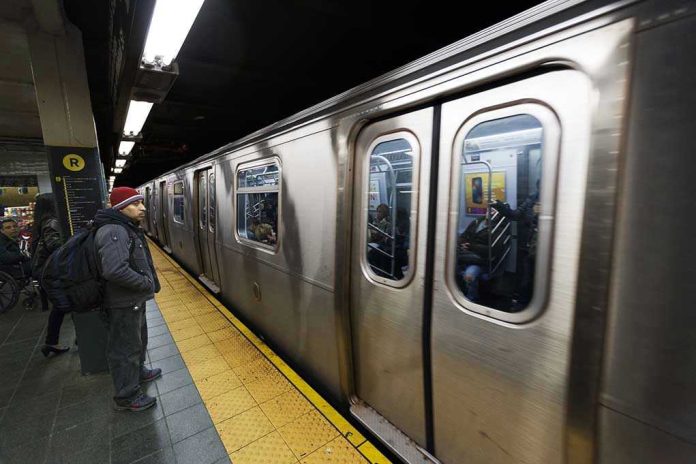
British rail passengers are shaken as political leaders cite the Huntingdon train stabbing—where a heroic staff member fights for life—as proof that leftist policies have eroded public safety and common sense.
Story Highlights
- Eleven people were injured, and a rail staff member critically wounded while protecting passengers during a mass stabbing on a UK train.
- The attack, initially feared to be terrorism, exposed vulnerabilities in public safety on transport and demanded swift emergency response.
- Authorities identified a sole suspect, a 32-year-old man, now in custody as the investigation continues.
- Calls for increased rail security and accountability rise, with officials and the public demanding answers and stricter safety measures.
Heroic Rail Staff Member Prevents Greater Tragedy
On November 1, 2025, a London North Eastern Railway train departing Peterborough became the scene of a violent mass stabbing. Within minutes, chaos erupted in coach J as a 32-year-old man began attacking passengers indiscriminately. Amid the panic, a rail staff member intervened, sustaining severe injuries while protecting others. This act of bravery was pivotal in preventing further harm, demonstrating the critical importance of individual courage when institutional safeguards fail. The train made an emergency stop at Huntingdon station, where armed police swiftly arrested two men, later releasing one as the investigation narrowed to a sole suspect.
Passengers and staff faced a terrifying ordeal that exposed alarming gaps in transport security. The incident, which left eleven hospitalized and nine fighting for their lives, has reignited public concern about safety on public transport. The staff member’s sacrifice is hailed by many as emblematic of the values—duty, courage, and community—that many feel have been undermined by years of bureaucratic mismanagement. Conservative leaders stress the need for robust security protocols and the restoration of common-sense policies that prioritize citizen safety over political correctness.
Emergency Response and Investigation Spotlight Systemic Weaknesses
Authorities responded rapidly, with the first emergency call made at 19:39 GMT and British Transport Police notified three minutes later. The train was halted at Huntingdon, enabling police intervention and the arrest of suspects. The swift activation of UK protocols for potential terror attacks, later rescinded, reflects ongoing readiness but also reveals the strain of increasingly frequent public violence. As investigators focus on a single suspect—a British man of Caribbean descent—questions arise about prior oversight, prevention, and the sufficiency of existing security measures. The event has prompted police and government officials to call for increased rail security and greater transparency, echoing the demands of a public weary of excuses and seeking real accountability.
The aftermath has seen heightened police presence on UK railways and renewed debate over the balance between civil liberties and public protection. Conservative voices argue that government overreach and leftist priorities have distracted from the core mission of safeguarding families and communities. They call for decisive action, including better staff training, stricter enforcement against dangerous individuals, and a reevaluation of policies that have left ordinary people vulnerable in everyday settings. The incident stands as a stark reminder of the dangers posed when essential values—personal responsibility, rule of law, and public order—are neglected.
Broader Implications for Public Safety and Conservative Policy Reform
Short-term disruption to rail services and heightened anxiety among commuters are immediate consequences of the Huntingdon stabbing. Politically, the event has fueled calls for legislative reforms to strengthen security protocols, empower law enforcement, and restore practical deterrents against violent crime. The economic impact—emergency response costs and ongoing medical care for victims—is compounded by broader social effects, including shaken confidence in public institutions. Conservative analysts highlight the need for a return to common-sense governance that rejects reckless spending, globalist distractions, and lax enforcement in favor of policies rooted in accountability and respect for constitutional rights.
Industry experts and rail unions have praised the rapid response and the staff member’s heroism but argue for systemic improvements in training and support. Security professionals warn that while emergency protocols were effective, ongoing vigilance and real reform are essential. The attack, though not terror-related, underscores the growing threat of violence in public spaces—a trend attributed by many to years of policy drift and political complacency. As the investigation continues, the event serves as both a sobering warning and a rallying point for those demanding safer, freer communities built on the enduring principles of individual liberty, strong families, and limited government.
Huntingdon train stabbing latest: ‘Heroic’ rail staff member fighting for life with man, 32, now sole suspect
Key details: https://t.co/Z7LOwm6PS8 pic.twitter.com/k5xD5N5g3y
— YoyoFeed United Kingdom (@Yoyofeed_Uk) November 2, 2025
Conservative leaders urge their constituents to remain informed, vigilant, and steadfast in defending values that have kept society safe and prosperous for generations. The tragic events on the Huntingdon train reveal not just a failure of security, but a broader need to reclaim the commonsense policies and constitutional protections that have always been the bedrock of American—and Western—society.
Sources:
2025 Cambridgeshire train stabbing – Wikipedia
Huntingdon train stabbing: Heroic rail staff member fighting for life – Jerusalem Post
What we know so far about knife attack on busy train – Sky News
Eyewitness recalls stabbing of train worker – Sky News Video




